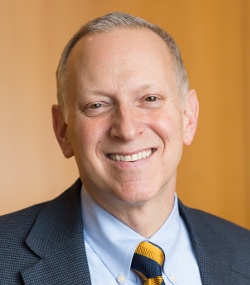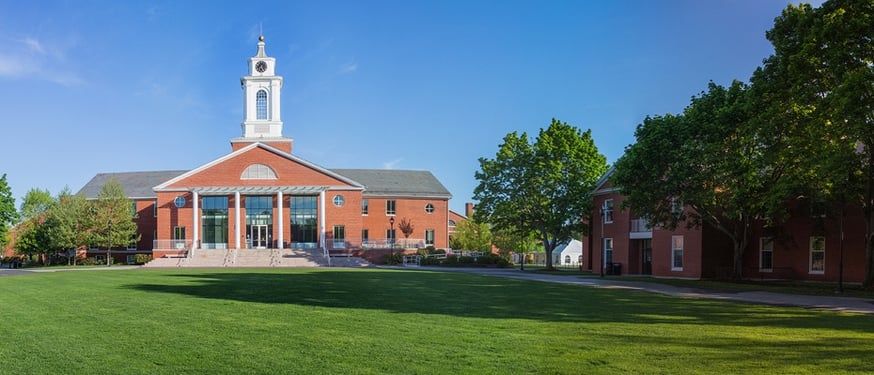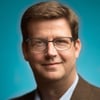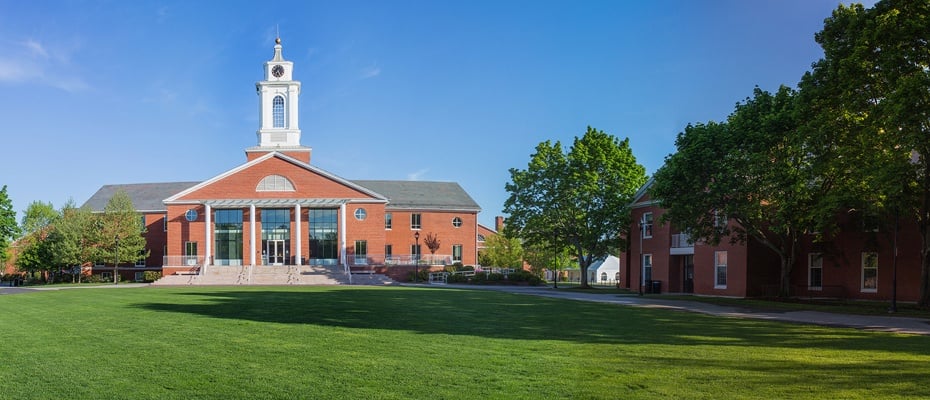Heller Search: Can you summarize your career background?
Bob Wittstein: I had been a CIO in several industries since 1999; however, these were not thriving industries – promotional marketing during the dot-com bust, followed by the pulp and paper industry. I should have done more homework. Also, those industries were migrating away from the Boston area and New England.
My career strategy was to find an industry that was growing and prevalent in the Boston area. However, I knew that to break into any new industry, I may have to take a step back, learn everything I could about the new industry, establish myself and my competencies in the new industry, and then find the opportunity to regain the top technology position with the new skills established and a reputation to match the skills. Higher education became that industry.
Were you actively looking for a job when you heard about the Bentley University CIO position?
I was not actively looking. I was contacted by an executive recruiter.
What about your professional background was attractive to Bentley?
 Career experience, the industry (higher ed.) and a good reputation in the profession. Five years prior I had joined Harvard’s Faculty of Arts and Sciences (FAS) IT department as the interim CIO. It was interim because their plan was to merge the FAS IT and the Central IT departments a year later under a new University CIO.
Career experience, the industry (higher ed.) and a good reputation in the profession. Five years prior I had joined Harvard’s Faculty of Arts and Sciences (FAS) IT department as the interim CIO. It was interim because their plan was to merge the FAS IT and the Central IT departments a year later under a new University CIO.
This was a huge break that I took full advantage of. I was able to demonstrate leadership and numerous other competencies, which led to a new full-time position in the new IT department leading all Administrative Technology.
What were you looking for in your next CIO role?
The opportunity to build something new and mission critical, and to develop a strategy focused on the mission of a university.
At the end of the day (and at my age!) work has to be fun. Building teams, building strategy, defining mission, vision and values, and executing is fun!
What piqued your interest in the CIO opportunity at Bentley?
Higher education automatically caught my eye, as this was part of my career master plan. Things that appealed to me about Bentley in particular included its size, the mission, and the state of the IT department.
Bentley is about the size of Harvard’s FAS. I have never felt bigger is better. Medium is my sweet spot.
Why do you like medium-sized?
Medium is large enough to have critical resources, or opportunities to collaborate without excessive and costly overhead, or excessive process. It means having good governance and process while still being nimble and able to make quick decisions.
What else was appealing about Bentley?
Bentley is also very mission-driven and goal focused. The strategic plan clearly defines what the University wants to be and how it is achieving this, and the desire is to have IT play a major role in the strategy.
With my commercial sector background, Bentley’s business focus appealed to me. In particular, the fusion of business and liberal arts is right up my alley. (I’m an engineer-technologist that enjoys artistic woodworking and playing guitar).
Finally, the job description was very strategic in nature, which was attractive, but the section describing the state of technology mentioned that there were over 350 servers in two data centers on campus… I thought, “Hmm, no cloud? No outsourcing? Minimal governance and a small staff?” This was almost identical to what I had walked into at Harvard. I enjoyed my role in driving improvements there so I knew that I could and would enjoy doing the same at Bentley.
Besides your resume, was there other professional branding, such as a blog, that helped position you for the job?
I do not blog and I barely tweet. CIOs are generally too busy. Maybe I should do more to promote myself, but I am generally not looking to move around.
I was asked to submit a Letter of Interest that ‘told my story’, including career background, personal management philosophy and leadership style. I also wrote about what I felt I could do for the University and how I would approach the position. I felt that nailing this letter was more important than my resume. Resumes are about history and are really only valid for the most recent ten years, or less. This letter was my chance to tell my story in my own voice. It was essentially a first interview. In fact, at every interview I went on, and there were many, the interviewer had this letter in hand and discussed it with me.
What was your interview strategy?
To be myself and tell my story in a way that described what I could do for the University through teams, relationships and as an individual. I had my story and I stuck to it through many interviews. That does not mean it never changed as I learned more; but, these were adjustments and not changes to my story.
Harvard was an incredible learning experience and, as a result, I felt very comfortable knowing what I needed to do to be successful and make a positive difference at Bentley. If Bentley wanted something different, changing my story just to get the job would not have been good for anyone. So, I stuck to my story, landed the right position and I believe that, today, we are all happy for our honesty and transparency.
What was Bentley looking for in their new CIO?
Most importantly, what they were NOT looking for was someone to just keep the trains running. That would be a manager of IT. Bentley was looking for a Cabinet-level partner who would figure out how to weave technology into the University mission as an enabler, as opportunity and as part of the brand, while also focusing on exemplary service delivery in a cost-effective manner. They were also looking for a partner that fit the Bentley culture.
Does anything stick in your memory about the job interview process?
The interviewers were very honest and transparent. Everyone knew there were issues that had to be dealt with in IT, and did not attempt to hide them. They really wanted to understand how I would approach fixing things regardless of whether it involved people, process or technology.
It was a pleasant surprise to learn that we do not work on Fridays from late May into August. Four day weeks in the summer are awesome!
How did you prepare to start your new role?
I worked for over 5 years at Harvard and 28 years in industry prior to that. But seriously, I read everything I could find that pertained to Bentley or my perceived needs of Bentley, and I spoke with no less than 40 people during the interview process, affording me the opportunity to ask many questions of faculty, students and staff. I also looked for connections to Bentley within my own network to help prepare for both the interviews and for Day One.
Who do you report to?
The Provost, the VP of Administration and Finance, and I sit on the President’s Cabinet. It is always complicated in higher ed. This gives me three votes since I am always going to work with the Provost and the VPAF to gain alignment, and then move forward. If I am not starting with three votes, it is probably not worth pursuing.
What are some of the concrete steps you took to learn about the University and build relationships?
I conducted an assessment to form a rough plan on how to move forward. This involved about 40 or so faculty, students and staff. I invited folks to lunch and in a casual setting, learned about each of their areas and their concerns. I also had the opportunity to sit in on an online class and an on premise class. I also requested to join several academic committees as a guest or as an ex officio member, including the Faculty Senate and the Dean’s Council, so that I could be (and be seen by others as) connected to the academic mission of the University.
Did you find anything that was on fire and needed to be dealt with right away?
Our infrastructure team had several vacancies in leadership, and costs were skyrocketing without a strategy for better service and containment, but I expected this would be the case. Also, there was universal agreement by the community that our ERP system no longer served the modern needs of the University. This precipitated the move to Workday, which was a necessary step.
What are some technical changes you have made, or that are in store?
We have organized our vision into (1) foundational strategies, (2) common platforms and (3) mission focused technologies such as teaching, learning, research and administration. Our plans include a strategic expansion of online pedagogy and high performance research computing. We have already started implementing Workday with HCM being recently completed, Finance underway and Student in the near future. We have implemented Salesforce for undergraduate enrollment. We are about to implement Identity and Access Management as a precursor to Office365, and we are starting to research how to move our remaining non-SaaS applications to the cloud and get ourselves out of the data center business.
Have you made many personnel changes?
On my eleventh day on the job, I received full Cabinet support to hire 12 new positions over the next two fiscal years. This was unprecedented and speaks volumes to the Cabinet’s dedication to turning IT around and making it a stronger part of the Bentley strategy. To date, I have hired a Director of PMO and several project managers, including one dedicated to security. I have hired a Director of Infrastructure and a Manager of Network Services, and I am about to open a search for an Enterprise Architect. The future holds openings for IT Service Management (ITSM), data architecture and vendor management.
What would you say were the keys to success for your first 100 days?
Building strong relationships with all groups, including faculty, students and staff; doing more listening and learning than talking; telling stories and being human; speaking in plain English about the value of IT to the higher ed. mission rather than talking about technology through acronyms; being both a partner and a service provider.
Also, figuring out some quick wins and delivering them. For example, the faculty wanted Macs…now they have Macs. Students wanted printers in the dorms and now they have them. Small things can matter a lot.
Lastly, getting my arms around the budget.
What achievements are you most proud of so far?
Developing the IT strategic plan and, even better, getting the buy-in from the Cabinet due to how they perceived it would advance the Bentley University strategy. The Cabinet is currently helping me find the funding to move it forward. Also, rebuilding the IT leadership team with a diverse mix of existing employees in possession of institutional knowledge, and new people bringing in fresh ideas.
What new consumer technology do you find exciting personally?
Modeling amplifiers for guitar. They simulate any combination of classic amps, pedals and special effects by crowdsourcing a library of tones that can be searched by playing music from your own library. This takes all the complexity of amplifiers and other equipment and replaces it with a simple, almost featureless, high quality amp. The complexity is moved to the software and an IOS app. But when I retire, I still want to go analog!
What does digital transformation mean at Bentley?
It means that online teaching and learning is more than a technology… it is also a pedagogy and a revenue model. It means that researchers can collaborate seamlessly with academia, government and industry to produce innovative research that helps the world. It means we can run the University efficiently with meaningful information at our fingertips so that more money can be directed toward students and the teaching/learning/research mission of the University.
What advice do you have for sitting CIOs thinking about a move to a bigger role and a bigger challenge?
Be careful what you wish for. Bigger is not always better. If you are not a fan of bureaucracy and layers, bigger may be worse. Go for the job that will be fun…because you have to do it every day. Do you like travelling or staying put? Are you high energy or looking for better work life balance? (not mutually exclusive) Are you a relationship builder or more of a pure technologist? Strategy and/or execution? Understanding what you enjoy and focusing on these things will help you find the right next position in a sustainable manner. Just chasing dollars, cachet and title is often the best way to fail or be unhappy.
About Bob Wittstein
Bob Wittstein joined Bentley University in Waltham, MA, as CIO in 2015. He spent five years at Harvard University leading IT for the Faculty of Arts and Sciences and administrative technology for the University. Prior to Harvard, Wittstein served as CIO of Sappi Fine Paper for seven years. He has a total of 34 years of experience in information technology, operations, procurement and manufacturing engineering. He holds a BS in mechanical engineering from University of Connecticut and an MBA from the University of New Haven.


Written by Steve Rovniak
Steve Rovniak served as Executive Director, Marketing and Media at Heller Search Associates from 2012 to 2023.



